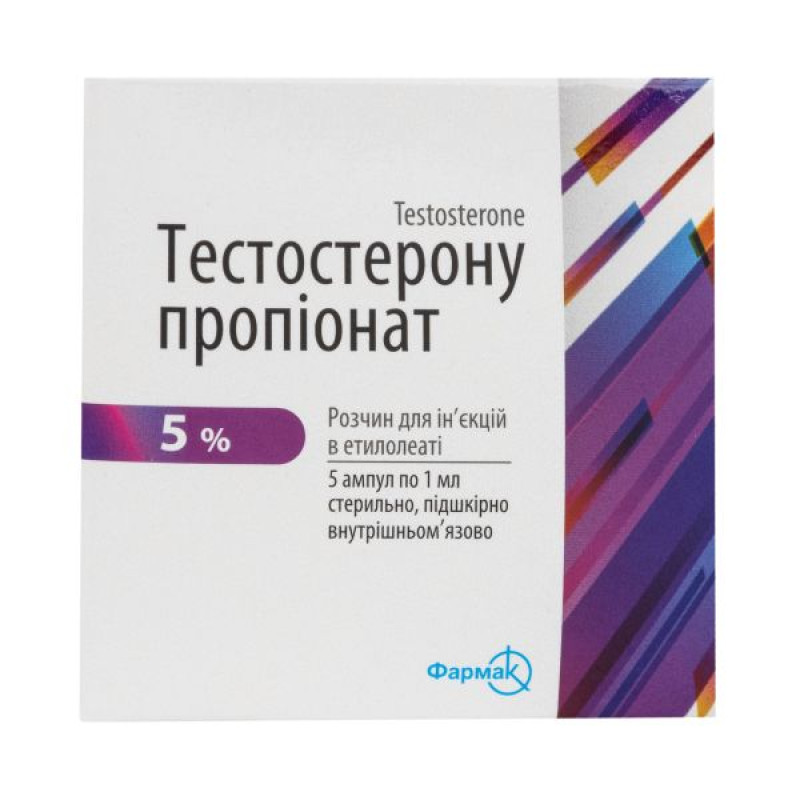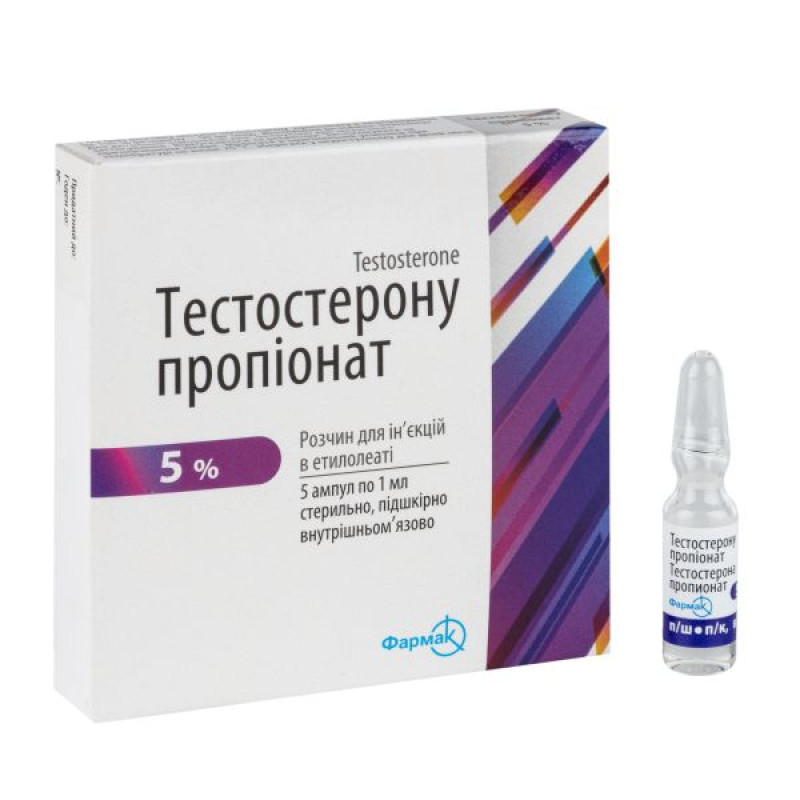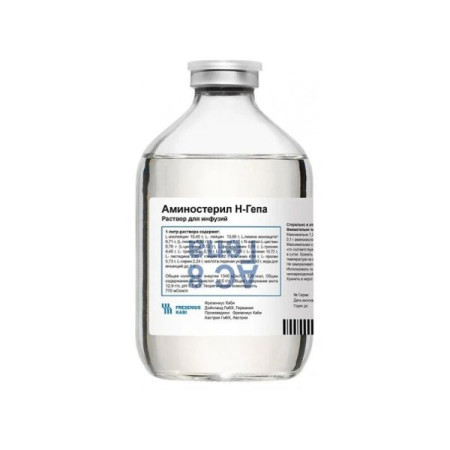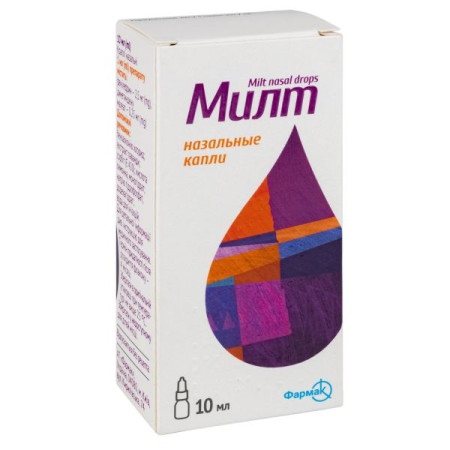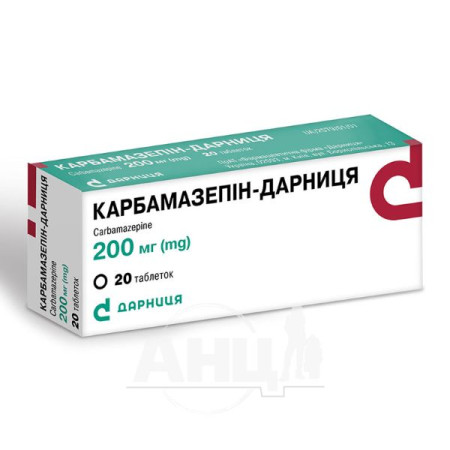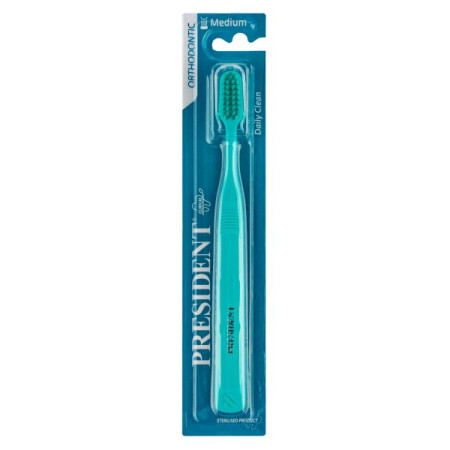Testosterone propionate solution for injection in oil 5% ampoule 1 ml No. 5
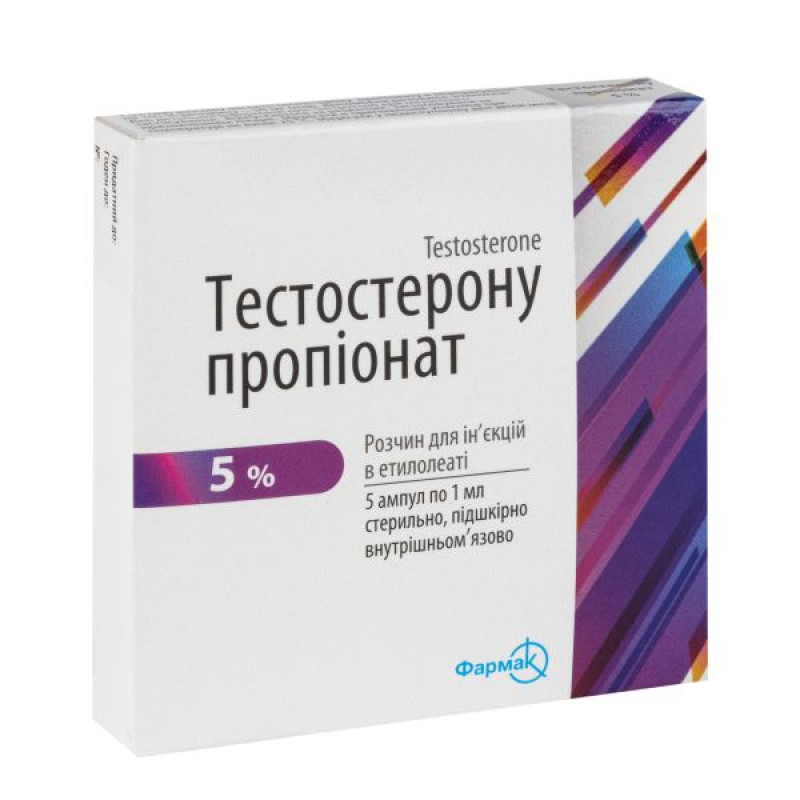
Instructions for Testosterone propionate solution for injection in oil 5% ampoule 1 ml No. 5
Composition
active ingredient: testosterone propionate;
1 ml of solution contains testosterone propionate in terms of 100% substance 50 mg;
excipient: ethyl oleate.
Dosage form
Solution for injection.
Main physicochemical properties: oily liquid of light green or light yellow color with a specific odor.
Pharmacotherapeutic group
Androgens. ATX code G03B A03.
Pharmacological properties
Pharmacodynamics
Testosterone propionate has a specific androgenic effect: stimulates the development and function of the external genitalia, prostate gland, seminal vesicles, as well as secondary sexual characteristics in men (voice, hair). Participates in the formation of the body constitution and sexual behavior in men, increases libido and potency, stimulates spermatogenesis. Reduces the production of luteotropic and follicle-stimulating hormones. Testosterone is an antagonist of female sex hormones - estrogens, has an antitumor effect on breast tumors in women. Has an anabolic effect, which is manifested in the stimulation of protein synthesis, reducing fat deposition, retention in the body of potassium, phosphorus, sulfur necessary for protein synthesis, increased fixation of calcium in bones and an increase in muscle mass. With sufficient protein nutrition, stimulates the production of erythropoietin.
Pharmacokinetics
After intramuscular or subcutaneous administration, it is slowly absorbed from the injection site. Testosterone circulating in the blood enters the target organs, where it is reduced to 5-a-dihydrotestosterone, which interacts with cell membrane receptors and penetrates the cell nucleus. Up to 98% of the drug in blood plasma binds to proteins, mainly globulins. It is metabolized in the liver to inactive and inactive metabolites that are excreted from the body in the urine. Approximately 6% of the drug is excreted unchanged through the intestines.
Indication
For men
Replacement therapy for primary and secondary hypogonadism, eunuchoidism; endocrine impotence, post-castration syndrome, age-related androgen deficiency in men; infertility due to impaired spermatogenesis (except Sertoli cell syndrome), oligospermia; osteoporosis caused by androgen deficiency.
For women
As part of the complex treatment of breast cancer in postmenopausal women.
Contraindication
Individual intolerance to the drug, prostate cancer or breast cancer in men, liver tumors, including a history, severe liver dysfunction, hypercalcemia, hypercalciuria, untreated congestive heart failure, ischemic heart disease.
Interaction with other medicinal products and other types of interactions
When combined with substances that are inducers of microsomal liver enzymes (barbiturates, rifampicin, carbamazepine, phenylbutazone, phenytoin), the effect of testosterone may be weakened. In severe hypogonadism, Testosterone propionate can be combined with drugs that stimulate the thyroid gland, estrogens. Enhances the effect of anabolic agents, vitamins, drugs containing calcium, phosphorus, slows down the elimination of cyclosporine.
Androgens may increase glucose tolerance and reduce the need for insulin or oral antidiabetic drugs in individuals with diabetes.
Androgens may affect the metabolism of other drugs (increased serum concentrations of oxyphenbutazone have been observed). In addition, testosterone and its derivatives have been reported to increase the activity of oral anticoagulants, which may require dose adjustment. Regardless of this fact, restrictions regarding intramuscular injections should always be observed in patients with acquired or hereditary blood clotting disorders.
Concomitant use of testosterone and adrenocorticotropic hormone or corticosteroids increases the risk of edema.
Barbiturates and alcohol reduce testosterone activity.
Impact on laboratory test results
Androgens can reduce the level of thyroxine-binding globulin, thereby leading to a decrease in total thyroxine levels and increased uptake of triiodothyronine and thyroxine. However, the concentration of free fractions of thyroid hormones remains unchanged. There are no clinical signs of deterioration of thyroid function.
Application features
As with all oil solutions, Testosterone Propionate Injection should only be administered intramuscularly and very slowly (over 2 minutes). Pulmonary microembolism with oil solutions may in rare cases cause symptoms such as cough, shortness of breath, malaise, hyperhidrosis, chest pain, dizziness, paresthesia or syncope. These reactions may occur during or immediately after injection and are reversible. Therefore, the patient should be monitored during and after each injection to ensure early recognition of possible symptoms of pulmonary oil microembolism. Treatment is usually supportive, e.g. oxygen therapy.
Data on the safety and efficacy of the drug in patients over 65 years of age are limited. There is currently no consensus on age-related testosterone levels. However, it should be noted that physiological serum testosterone levels decrease with age.
Use with caution in patients with heart failure, hypertension, epilepsy, migraine, and renal impairment.
Patients with epilepsy or migraine (even a history) should be under medical supervision, as androgens can sometimes cause fluid and sodium retention in the body.
Patients receiving androgens who achieve normal plasma testosterone levels after testosterone replacement therapy may experience increased insulin sensitivity.
Certain clinical symptoms such as irritability, nervousness, weight gain, persistent or frequent erections may indicate androgen overdose and require dose adjustment.
Tumors
Androgens can accelerate the development of subclinical prostate cancer and benign prostatic hyperplasia.
The drug should be used with caution in patients with cancer who are at risk of developing hypercalcemia (and associated hypercalciuria) due to bone metastases. Regular monitoring of serum calcium levels is recommended in such patients.
Benign and malignant liver tumors have been reported in individuals taking hormonal agents, particularly androgenic compounds. If a man receiving treatment develops severe upper abdominal pain, liver enlargement, or signs of intra-abdominal bleeding, a liver tumor should be excluded from the differential diagnosis.
Hepatic or renal insufficiency. Studies to study the efficacy and safety of the drug in patients with impaired renal or hepatic function have not been conducted. Therefore, testosterone replacement therapy should be used with caution in such patients.
Heart failure: Caution should be exercised in patients with a predisposition to edema, such as those with severe cardiac, hepatic or renal insufficiency or ischemic heart disease, since treatment with androgens may lead to increased sodium and water retention. In the event of severe complications characterized by edema with or without congestive heart failure, treatment should be discontinued immediately (see section "Adverse reactions").
Testosterone can cause an increase in blood pressure, and the drug Testosterone propionate should be used with caution in men with hypertension.
Blood clotting disorders
It is necessary to observe the conditions for intramuscular injections in patients with acquired or congenital blood clotting disorders.
Testosterone and its derivatives have been reported to enhance the activity of oral anticoagulants, coumarin derivatives (see also section “Interaction with other medicinal products and other types of interactions”).
Testosterone should be used with caution in patients with thrombophilia, as thrombotic events have been observed in this group of patients during testosterone therapy in the post-marketing period.
Due to the possible tendency to thromboembolism, the drug should be prescribed with caution to men after recent surgery or injury.
Use the drug with caution in patients with porphyria.
During treatment with the drug, liver and kidney function, thyroid function, and blood sugar levels should be monitored.
Before starting treatment in men, it is necessary to exclude the diagnosis of prostate cancer, since when using the drug, androgens increase the risk of developing prostatic hyperplasia.
In patients receiving testosterone treatment, it is necessary to regularly and thoroughly check the condition of the prostate and mammary glands using generally accepted research methods at least once a year or twice a year in elderly patients and special categories of patients (with clinical or hereditary risk factors).
In patients taking androgens for a long period, in addition to testosterone concentration, the following laboratory parameters should be checked: hemoglobin, hematocrit (initially every 3 months, then once a year), and liver function tests.
Caution should be exercised when prescribing to men with sleep apnea. Testosterone has been reported to cause or worsen sleep apnea. Clinical judgment should be used with caution in patients with risk factors such as obesity and chronic lung disease.
Drug abuse or addiction. Androgens should not be used to enhance muscle development in healthy individuals or to enhance physical performance.
Ability to influence reaction speed when driving vehicles or other mechanisms
While taking the drug, you should refrain from driving and working with other mechanisms.
Use during pregnancy or breastfeeding
There are no sufficient data on the use of the drug during pregnancy or breastfeeding. Given the characteristic virilizing effect of the drug on the fetus, its use is contraindicated during pregnancy or breastfeeding. The drug should be discontinued when pregnancy is diagnosed.
Method of administration and doses
For men with eunuchoidism, congenital underdevelopment of the gonads, their removal by surgery or as a result of trauma, as well as with acromegaly, the drug is administered intramuscularly or subcutaneously at 25–50 mg every other day or every 2 days. The duration of the treatment course depends on the effectiveness of therapy and the nature of the disease. After the clinical picture improves, Testosterone propionate is administered in maintenance doses of 5–10 mg daily or every other day. For endocrine impotence, as well as for male menopause accompanied by vascular and nervous disorders, Testosterone propionate is administered at 10 mg daily or 25 mg 2–3 times a week for 1–2 months. For the treatment of male infertility, the drug is administered at doses of 10 mg 2 times a week for 4–6 months or 50 mg every other day for 10 days. In case of pathological male menopause, the drug is prescribed at a dose of 25 mg 2 times a week for 2 months with a monthly break for 1–2 months.
For women, as part of a comprehensive treatment for breast cancer, use 100 mg 2–3 times a week.
Children
Safety and efficacy in children have not been studied, so the drug is not recommended for use in pediatric practice. The use of testosterone in children may cause masculinization, accelerated growth and maturation of bone tissue, as well as premature closure of the epiphyseal growth zone, which will ultimately lead to a decrease in final height.
Overdose
When using the drug in high doses or for a long time, side effects described in the relevant section may develop. In this case, the use of the drug should be discontinued, and after the disappearance of androgen-dependent side effects, it should be continued in reduced doses. If necessary, symptomatic treatment should be carried out.
Adverse reactions
From the reproductive system and mammary glands: priapism, increased sexual arousal, increased libido and frequent erections, gynecomastia, pain in the mammary glands. When using high doses in men, inhibition of spermatogenesis, testicular atrophy is possible. Androgens in men can cause prostatic hyperplasia, growth of malignant prostate tumors. In women, masculinization (virilism) phenomena may be observed: deepening of the voice, excessive hair growth on the face and body, pastiness of the face, suppression of ovarian function, menstrual disorders, atrophy of the mammary glands and endometrial tissues, oily skin, clitoral hypertrophy. Virilization may be irreversible even after discontinuation of testosterone.
Respiratory system disorders: respiratory disorders, sleep apnea.
Musculoskeletal system: leg pain, arthralgia, muscle cramps.
Gastrointestinal disorders: diarrhea, nausea, gastrointestinal bleeding.
Hepatobiliary disorders: increased aminotransferase levels, liver function abnormalities, jaundice, cholestatic hepatitis, cases of liver tumors have been reported with high doses for a long period of time.
From the blood and lymphatic system: isolated cases of polycythemia, tendency to thrombosis, increased hematocrit, inhibition of blood clotting factors.
Skin and skin derivatives: various skin reactions, including acne, seborrhea, alopecia, itching.
Metabolic and nutritional disorders: weight gain, hypercalcemia, glucose metabolism disorders, increased low-density lipoprotein levels, decreased high-density lipoprotein levels.
Neurological disorders: dizziness, increased sweating, headache, nervousness, depression.
General disorders and administration site conditions: injection site pain, subcutaneous hematoma at the injection site; long-term treatment with Testosterone propionate or its use in high doses may sometimes lead to an increased incidence of fluid retention and edema; hypersensitivity reactions, including fever, chills, and a feeling of heat throughout the body.
Expiration date
2 years.
Do not use the drug after the expiration date indicated on the package.
Storage conditions
Store in the original packaging at a temperature not exceeding 25 °C.
Keep out of reach of children.
Packaging
1 ml in an ampoule. 5 ampoules in a pack
Vacation category
According to the recipe.
Producer
JSC "Farmak".
Location of the manufacturer and its business address
Ukraine, 04080, Kyiv, Kyrylivska St., 74.
There are no reviews for this product.
There are no reviews for this product, be the first to leave your review.
No questions about this product, be the first and ask your question.







